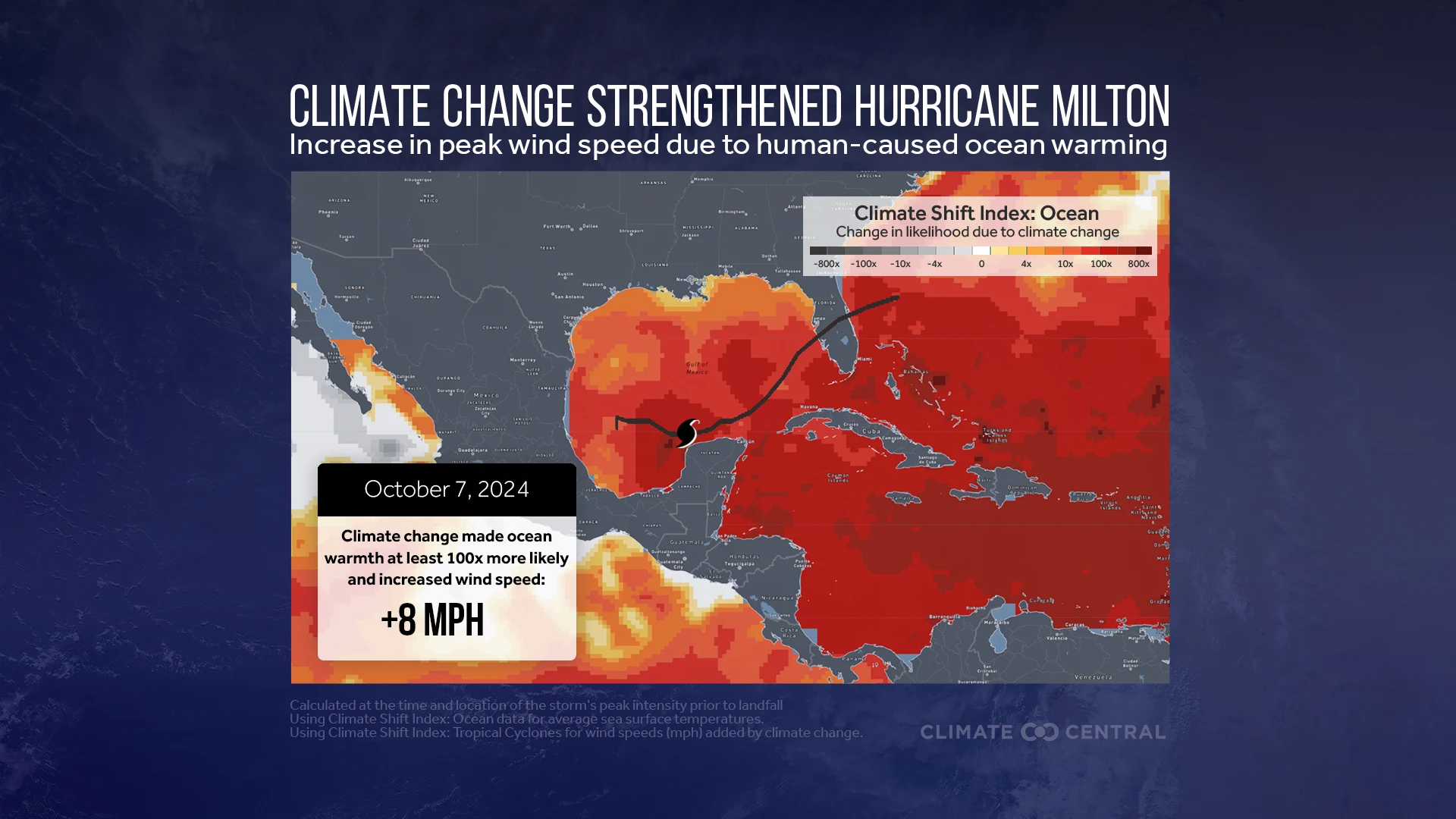Climate Matters•November 20, 2024
Study: Ocean warming has intensified recent hurricanes
Updated July 8, 2025 |
|---|
KEY CONCEPTS
Ocean temperatures made higher by human-caused climate change are fueling more intense hurricanes in the Atlantic.
Climate Central’s new study, published in Environmental Research: Climate, shows that climate change increased the intensity for most Atlantic hurricanes between 2019 and 2023 — and for every storm so far in 2024.
Thirty hurricanes in the study (out of 38) reached intensities roughly one category higher on the Saffir-Simpson Hurricane Wind Scale compared to their expected strength in a world without climate change.
Climate Central published an additional report, Climate change increased wind speeds for every 2024 Atlantic hurricane, expanding the analysis framework to the 2024 Atlantic Basin hurricane season.
This Climate Central analysis was made possible in part by open access data from NOAA and the National Hurricane Center.
Read the report
Climate change caused the maximum wind speeds generated by roughly 80% of Atlantic Basin hurricanes from 2019 and 2023 to intensify by an average of 18 miles per hour, according to a new Climate Central study published in Environmental Research: Climate.
These hurricanes were fueled by sea surface temperatures made higher by human-caused global warming.
Thirty hurricanes out of 38 in the study reached intensities roughly one category higher on the Saffir-Simpson Hurricane Wind Scale compared to their expected strength in an environment without influence of human-caused climate change.
The study identified three storms that strengthened into Category 5 (strongest) hurricanes because of climate change: Lorenzo (2019), Ian (2022), and Lee (2023).
Potential damages from winds associated with each storm category (1 to 5) increase by roughly four times with each jump in category, according to NOAA’s assessment of hurricane damage potential. But even smaller increases in wind speed, without a category change, can dramatically increase potential damage.
Read the study: Human-caused ocean warming has intensified recent hurricanes, published in Environmental Research: Climate.
Climate change intensified every Atlantic hurricane in 2024
Alongside this peer-reviewed study, Climate Central published a report, Climate change increased wind speeds for every 2024 Atlantic hurricane, expanding the framework to the 2024 Atlantic Basin hurricane season.
Findings show that maximum wind speeds for all eleven hurricanes to date in 2024 were increased by 3 to 14 miles per hour because of elevated sea surface temperatures caused by climate change.

Read Climate Central’s full report: Climate change increased wind speeds for every 2024 Atlantic hurricane.
Warmer seas fuel more intense hurricanes
Climate Central’s Climate Shift Index: Ocean measures the influence of climate change on daily ocean temperatures and helps connect human-caused ocean warming to consequences, such as hurricane rapid intensification.
Hurricane Milton rapidly intensified by 120 miles per hour in less than 36 hours over waters whose temperatures were made 400-800 times more likely by climate change, according to a Climate Shift Index: Ocean analysis.
Those record-setting temperatures — commonly more than 3℉ above normal — would be virtually impossible without the influence of carbon pollution.

Worth watching: Dr. Daniel Gilford explains how this attribution science is linking climate change to the 2024 Atlantic Hurricane Season in this insightful conversation.
LOCAL STORY ANGLES
Five ways to use the Climate Shift Index: Ocean
Use the tool. The online map tool allows you to explore data showing which parts of the world are experiencing high Ocean CSI levels — every day.
Share custom maps. Use yellow buttons in the tool’s left panel to share a direct link to a custom map or download the current map view as a PNG file.
Download maps in KML format. The tool’s left panel also includes a link to download daily Ocean CSI maps in KML format for use in TV broadcasts.
Read the FAQs. Review common questions and answers on the science behind the Ocean CSI and expert guidance and caveats on using the tool in climate reporting.
Go deeper: read the peer-reviewed paper. Published by Climate Central scientists in May 2024, this openly accessible peer-reviewed paper presents the science behind the Ocean CSI system.
More resources on climate change and tropical cyclones
NOAA regularly updates a comprehensive summary of the science on Global Warming and Hurricanes, and offers a hurricane season Media Resource Guide. Climate Central’s Extreme Weather Toolkit: Tropical Cyclones provides reporting resources and multimedia graphics in English and Spanish.
CONTACT EXPERTS
Daniel Gilford, Ph.D.
Climate Scientist
Climate Central
Media contact: Peter Girard, pgirard@climatecentral.org
FIND EXPERTS
Submit a request to SciLine from the American Association for the Advancement of Science or to the Climate Data Concierge from Columbia University. These free services rapidly connect journalists to relevant scientific experts.
Browse maps of climate experts and services at regional NOAA, USDA, and Department of the Interior offices.
Explore databases such as 500 Women Scientists, BIPOC Climate and Energy Justice PhDs, and Diverse Sources to find and amplify diverse expert voices.
Reach out to your State Climate Office or the nearest Land-Grant University to connect with scientists, educators, and extension staff in your local area.
